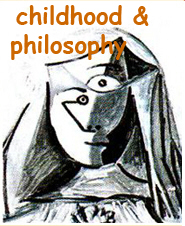philosophy with children through thought experiments
Keywords:
politics, puzzle pictures, simulation, thought experiments, utopiaAbstract
This article presents an approach to doing philosophy with children through thought experiments, by focusing on one in particular concerning founding a utopia. Describing the group’s practice and the role of philosophy in the dialogic learning process provided by the mental simulation concerning utopia, the author presents some elementary observations on the central role played by thought experiments both in philosophy and in the natural sciences, and stresses a variety of interesting implications for doing philosophy with children through thought experiments. Finally, by examining some issues emerging from John Dewey and Jerome Bruner, the author argues that mental simulation can be an engaging introduction to doing philosophy with children, who are enabled in this way to envision conflicting possibilities and to face them through something like Wittgenstein’s “puzzle pictures” technique. The introduction of thinking in the form of a puzzle allows us to increase our level of curiosity concerning the route to be taken toward, and the motivation to come up with common solutions: children learn to formulate assumptions and to talk, both of which represent forms of what Bruner calls “reciprocal teaching” and “co-construction of meanings.” In conclusion, a diagram is offered that summarizes schematically the flow of reflective thinking activated in the mental and philosophical experiences studied in this article.Downloads
Published
2013-01-08
How to Cite
mori, luca. (2013). philosophy with children through thought experiments. Childhood & Philosophy, 8(16), 265–290. Retrieved from https://www.e-publicacoes.uerj.br/childhood/article/view/20725
Issue
Section
articles




